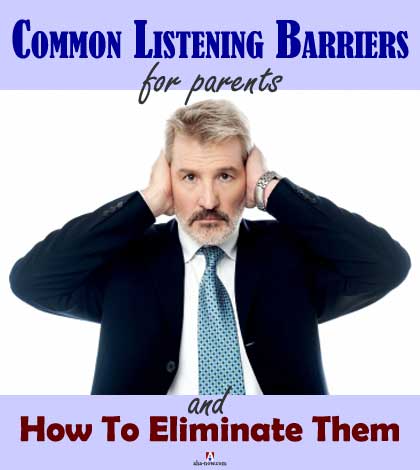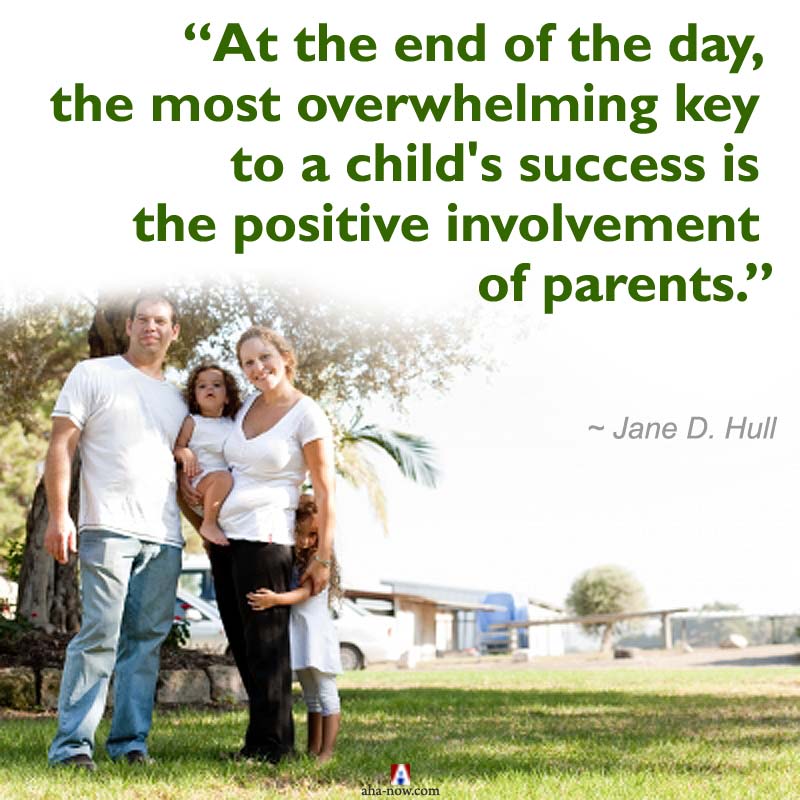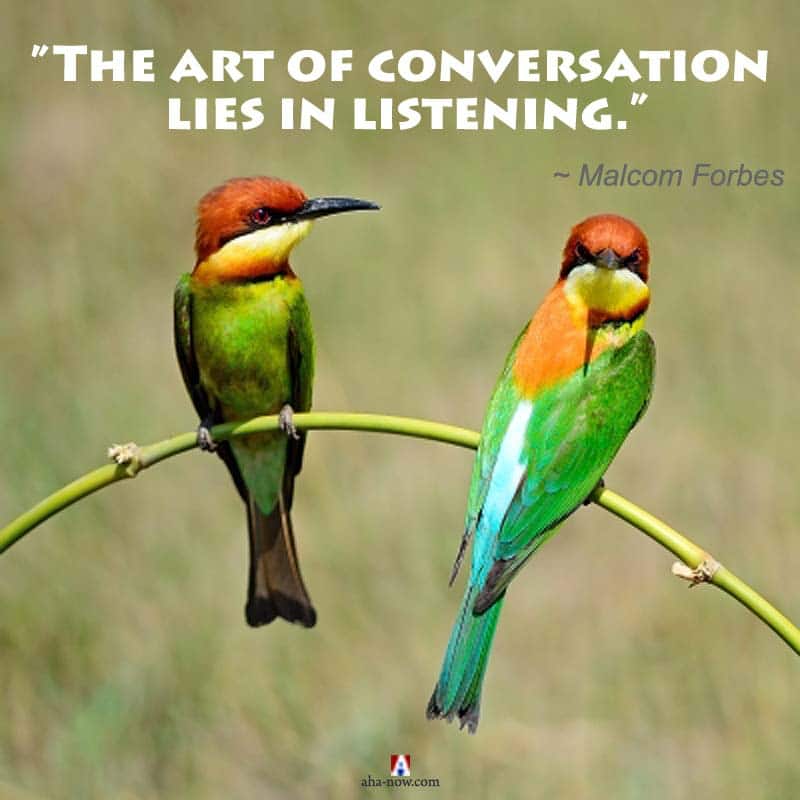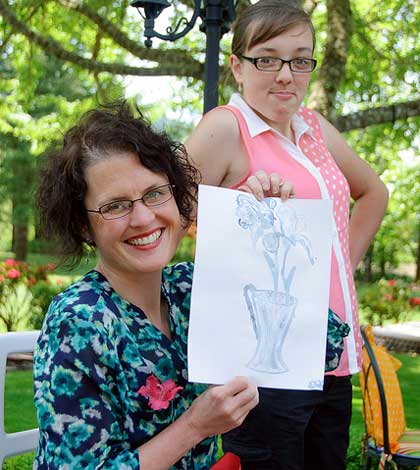Common Listening Barriers For Parents And How To Eliminate Them

Table of Contents
As parents, we want to build and maintain strong relationships with our children.
We want them to find us trustworthy and supportive, nurturing and wise, generous and attuned.
One of the best tools we have for succeeding in these goals is our ability to listen to our children.
Unfortunately, most of us don’t listen as well as we could (or even think we are).
While many behaviors keep us from fully hearing our children, I will focus on three listening barriers I most commonly witness in my coaching work, as well as practices you can take to remove these and other barriers to become a better listener with your children.
Lose Your Fixation on “Fixing”
First up may be parents’ hardest behavior to change: advising.
Instead of listening with no objective in mind, when we’re in advising mode, we’re listening for the information we need to be able to solve the “issue” our child is facing.
While part of our brain is taking in what our child is saying, another portion is busy formulating useful solutions to her or his situation.
At best, we’re hearing just a portion of what our child is telling us because we’ve already decided what the purpose of our listening is.
The intention behind this listening barrier is noble: we want to help our daughters and sons.
As older, and sometimes wiser, humans, we are confident that offering our own perspective or life experience will prevent our children from making similar mistakes, enduring similar hurts, or otherwise having a less-direct route to their desired destination.
Just because our child is telling us about a problem, however, doesn’t mean the advice is what he or she desires. Nor is it necessarily what he or she needs, even if it’s what they want.
Fixing is a form of judgment. All judgment creates distance, a disconnection, an experience of difference. In fixing, there is an inequality of expertise that can easily become a moral distance. ~ Rachel Naomi Remen
Fortunately, there are some simple practices you can take to pause your advice-giver-parent-self so that your openly-listening-parent-self can shine.
Listen with No Agenda in Mind
Do your best to fully hear whatever your child is telling you.
Stephen Covey’s teaching of “seek first to understand” may have evolved from his observation that “Most people do not listen with the intent to understand; they listen with the intent to reply.”
When your daughter hops in the car after school and complains about her day, resist the urge to offer “helpful” suggestions. Instead, pretend you’re a sponge whose purpose is to soak in this girl’s full communication.
Save Advising for a Different Time Entirely
If you do have ideas that you want to offer your son on an experience he’s just related, wait before sharing.
If he recounts an unhappy event when you pick him up from a play date, just listen.
Then at dinner, bring the subject back up: “When you told me about the fight you had with Spencer, it sounded like you might want ideas about how to keep him from bossing you around. Is that right?”
Ask Before Offering any Advice
If you do feel compelled to give your perspective, ask permission first. “Would you like a few ideas from me about the situation you just shared?”
Asking this question is a simple way to ensure that your child is actually looking for your input.
Some other options include: “I have some ideas about what you might do about the situation. Would you like to hear any of them?” or “Thanks for sharing that with me. Is there anything you would like from me right now?”
The first duty of love is to listen ~ Paul Tillich
Stop Being a Distracted Listener
Partial listening is another common behavior that prevents us from fully hearing our children.
Maybe we’re in heavy traffic and need to devote more attention to driving than listening. Perhaps we’re engrossed in cleaning our email inbox when our daughter plops down on the couch and starts talking, or we might simply intend to send a “quick” email to our boss while our child is “mindlessly” chatting to us at the breakfast table.
Though not every exchange with our children demands single-minded focus, deeply listening to our children is one of the ways that we foster a sense of trust and care upon which a healthy long-term relationship is built.
If you find it difficult to give your child your undivided attention, experiment with these three practices.

Slow Down and Simplify
For many parents, the fullness of life is one of the main barriers keeping them from deeply listening to their children.
When we are rushing from one activity to the next, always tending to a task on our agenda, or absorbed with thoughts about what’s just happened or what’s coming down the pike, we don’t have the mental space required for good listening.
If you’re feeling squeezed by life’s demands, saying “no” and creating breathing room may be the first step to take in being able to listen to your child.
Create a Listening-Friendly Environment
Good listening begins with an intention to listen and to have the space in which a conversation can easily take place.
Minimize distractions – mute that phone, turn off radios or TVs, ideally be alone with the person you want to hear – and set aside time to be uninterrupted.
Bottom line: When your goal is to listen you don’t multitask. By creating a listening-friendly space, you demonstrate to your children that being able to hear them and have time to talk with them is a priority for you, which can make it easier for them to open up.
Keep Certain Times Devoted to Listening
Beyond the act of creating listening-friendly environments, you can foster connecting conversations by having times that center around listening.
In my family, two favorite times are bedtime and waking time (before the brain fully disengages from the sleep and dream world).
NPR radio promotes their shows as inducing “driveway moments” where you stay in your car just to hear the end of a story or interview. You can apply this to listening to your children.
Instead of jumping out of the car when you reach a destination, take a couple of minutes to listen to your child and connect before going on to your next activities.
Get Comfortable with Discomfort
Sometimes our ability to listen is compromised by our emotions. One day, for instance, my daughter was telling me that she “hated” a girl at school. “Yikes!” my internal voice cried. “My daughter can’t hate someone. That’s not the kind of child I have!”
If I had heeded that inner critic, it would have been easy to stop listening, demanding instead that “You don’t hate her!” or insisting that she should not say such harsh things.
Listening well can mean listening through such discomfort and restraining our automatic impulses to teach, correct, moralize, explain, rationalize, or minimize.
The dominant culture tells us that parents know more than children and that our parental duty is to teach our children.
While there is some truth in both of these ideas, they nonetheless inhibit our listening well.
Listen earnestly to anything [your children] want to tell you, no matter what. If you don’t listen eagerly to the little stuff when they are little, they won’t tell you the big stuff when they are big, because to them all of it has always been big stuff. ~ Catherine M. Wallace
To break the hold of these cultural myths, we can employ a few different techniques.
Notice and Set Aside Your Own Internal Blocks
If you succeed in being a trustworthy listener for your child, the chances are that you will eventually hear something that triggers you.
Maybe your son describes “hating” someone, as my daughter did. Perhaps your daughter tells you that someone has been bullying her at school. Or maybe your discomfort arises when your children are telling you about what your former spouse said about you.
Whatever the situation, we enhance our effectiveness as a listener when we recognize that we’ve stopped listening and can put aside whatever has gotten in our way, and begin listening again.
If you pause periodically to reflect back to your child what you’ve heard them say, it can help prevent you from getting distracted.
You might also experiment with the practice of internal dialogue when you’re zoning out. “I’m feeling anxious about what Sam is telling me,” you might say to yourself, taking a deep breath as you do so.
By simply acknowledging your own emotions, you can often keep them from overwhelming you, and pulling your attention from your child’s story.

Listen First to Understand and Reflect That Understanding Back to Your Child
When understanding is our first goal of listening, our other motives may be less likely to kick in.
Yes, we may discover something we want to teach our child. We might even realize that our child has misinformation.
By listening fully with a broad objective of “understanding,” we can take in our child’s communication in a neutral manner.
After listening, repeat back what you heard your child say. This lets your child know that you’ve heard her and also gives her a chance to clarify anything you misunderstood.
Don’t Fake to Listen
When your children need to be heard, do whatever is necessary to be able to hear them. That might mean asking for ten minutes to finish an important work task, or calming down from an upset before you sit down to listen to your child.
Obviously, instances may arise when the time to listen is NOW, but in most cases, an important conversation can be postponed a few minutes or more.
It’s better to take the time to really hear your child than to half-listen right away. The first option shows that you truly want to hear what your child has to say.
The second communicates that you’re willing to pretend so that you can move on to the next task on your list.
Don’t be afraid to pause during listening to your child if you notice you’ve gotten distracted or are otherwise inhibited from truly hearing what they’re saying.
Tell your child, “I notice that I’m having difficulty hearing you right now. Let me take a few breaths to come back to myself, and then you can continue talking.” This is perfectly acceptable and preferable to zoning out and missing what they’re telling you.
Wrapping It Up
Listening is an art. It uses not only our ears, but our eyes, hearts, and intuition when done well.
Hearing our children is about setting our own agendas aside, making space for them to fill with the stories of their life experience.
When we listen fully, we offer our children a tremendous gift and strengthen the bonds of our relationship.
While it isn’t always easy to listen well, using the practices suggested above can help us eliminate the listening blocks that most commonly arise.
By creating an intention to understand our children, focusing our attention on them when they speak, and listening with openness to what is being said, we will earn our place on our children’s side as one of their most worthy confidantes.
Let’s hear from you
Which of these listening barriers is most familiar to you as a parent? What changes have you made to become a more trustworthy listener? If you’re committed to truly hearing your children, is there one of the suggested practices you’re open to using? Share in the comments.
Photo Credit: FreeDigitalPhotos.net
Disclaimer: Though the views expressed are of the author’s own, this article has been checked for its authenticity of information and resource links provided for a better and deeper understanding of the subject matter. However, you're suggested to make your diligent research and consult subject experts to decide what is best for you. If you spot any factual errors, spelling, or grammatical mistakes in the article, please report at [email protected]. Thanks.











HI Shonnie, nice post…indeed it improves your bond with them, and encourages them to listen to you
Thanks for chiming in Arun. Yes, our children can more easily give what they’ve gotten from us.
Thanks Shonnie – great advice here, It is so true we listen when we already know thw answer we are going to give! As you say, we are always trying to fix things – just listening will help solve many problems.
“Just listening” as you mentioned, Robert, is a skill that I know takes my practice daily. . . and sometimes I still forget (thinking I’m listening when I’m not doing so fully). Ah, the human condition.
Hi Shonnie, thanks so much for sharing this. It is such an important issue to be on top of as a parent. Number 1 really hit the nail on the head for me. My natural reaction is definitely to listen sufficiently to solve the problem, rather than just to hear and understand, with no agenda regarding giving the right advice to allow all of us to move on with our lives. If I’m not super intentional, this will definitely be my default. So thanks for a reminder that understanding is far more important than advising!
Craig, I acknowledge you for being so willing to see your own internal barrier! Many people prefer to look “out there” for the “problem,” not realizing that the first step toward change is with ourselves. 🙂
Hi Shonnie,
Thanks for this post. I think it applies to communication with everyone and not just children. Although we tend to be worse with children.
Because we’ve “heard” that story a million times over.
The funny thing is children are aware of the times we don’t pay attention.
I really liked the point you raised about telling them whether or not they have your full attention and asking for time.
Another mistake we tend to make is assuming they want our advice/suggestions. Husbands are also guilty of doing this with their wives. Sometimes, they just need to know that we understand and empathise with them.
Thanks for adding your voice, Ruth. I’m grateful you found useful info here. From my perspective, we can all keep learning — parents, husbands, wives, siblings, co-workers, children. Let’s keep it up!
Hey Shonnie,
I could not agree more. Parents want to fix and protect and that creates barriers. Rather than instilling problem solving into their child’s thinking. When a problem arises you ask you child, what do you think you should do? When a child acts up; ask what do you think you are getting trouble for? Once the child has answered then we should add our perspective.
Get comfortable with Discomfort. What a great point. I have always thought stopping a child from yelling and screaming and letting their emotions out on us adults is good for them. Its important to remember they are not yelling at us. They trust us enough to show us their warts and all. If we cut them off mid yell and expect them to behave we are saying their needs are not as valued as the parents. (Okay if your at a supermarket and this happens of course you would put a stop to it).
Distractions is such a big issue now, more so than it has ever been. It seems to be acceptable to talk while not facing someone or making regular eye contact. I find this disturbing in any context. So when you child wants your attention, either do what you advised, say give me ten minutes or give them your full attention – no half hearted attempts.
Wonderful topic and post. Really enjoyed it.
Rachel.
Thanks for taking the time to comment, Rachel. We can all improve our listening skills and I hope that something I wrote will speak to everyone who reads it. I’m glad you found it useful too!
Hi Shonnie,
Great to meet you here and you have brought up a very important topic. Although my kids are grown, I’ve always made time for listening. Usually at dinner…yes it was mandatory lol.
The best point is not to be distracted when listening. You may have things on your mind but you need to clear it and focus on that child with nothing else in your head. Don’t jump ahead…nor interrupt. Gosh when I think of this and how open my conversations with my daughters were there were some things I really didn’t want to know lol.
But, a child knows when you are listening and when you do you open the door to communication. And that, is the most important thing we can do as parents.
-Donna
Thank you Shonnie for sharing your wisdom 🙂 My kids are still little, but I know, soon I’ll be facing these types of communication problems with them. Your tips are just great and I’m now trying to put them into practice – preparing myself to be a patient listener first with all people around me.
I really liked what you said “resist the urge to offer “helpful” suggestions. Instead, pretend you’re a sponge .. “. That’s a gem of advice!
I’m delighted you found my ideas helpful, Sarika! Keep practicing while your children are young and you’ll be an even more attentive listener as they grow (and when you forget to listen, they will be able to remind you since you’ve been modeling “good” listening most of the time). 🙂
Hi Shonnie,
This is wisdom we all can use. Listening is an art and a gift.
It takes humidity to listen to our children without trying to solve their problems.
Growing up my mother was a great listener so you would think I would had picked up that gift.
But it’s something I willing to give my all to.
Because if we don’t become excellent listeners, our children will find someone else to listen to them.
Great post!
Thank you for your comments, Vernon. To me, listening well nearly always requires practice and practice. Not to get perfect, but simply to stay aware and focused. Keep it up!
Hi Shonnie,
Nice to meet you! Your wonderful tips on listening intently are going to help young parents who are always hard-pressed for time and rush through most of the activities. By the time they realise they have to make an effort to really listen, their children are already teenagers!
The most important part of listening, to my mind is ‘listening without distractions.’ Switching off all the digital distractions and paying attention to what children share encourages them to share more, they feel connected and loved. Also we must have an unbiased mind to understand their perspective.
Parenting is a challenging job and all aspects need to be taken into consideration. Thanks for sharing. Have a blessed weekend.
Thank you for your thoughtful comments, Balroop. I appreciate your addition of a “biased mind” as a listening barrier. Our passions and strong opinions do make it easy to stop listening the minute we hear something we don’t like.
Hi Shonnie
Very important topic you’ve covered in this post and if a child and his parents are asked separately the biggest grievance they have for each other they both would surely reply their point of view is not rightly gotten by the other.
Most of the complications in any kind of relationship take birth because of noise barrier in their communication so the best policy is to listen and fully influence other as well to listen carefully on his turn.
Very relevant tips and advises you gave in this post for better parenting that is one of the main reasons of so many problems of our younger generation.
Many thanks for sharing and have a super wonderful weekend ahead.
Thanks for taking the time to read my article and comment, Mi Muba. It is interesting that sometimes our upset with another might also be the same upset they have with us. Peace to you.
Hello Shonnie and welcome to Harleena’s blog…
You have indeed stressed-out points every parents should considered.
The best thing you could do for a child is give them listening ears when they need it… and that is what i am doing for my son, we always talk and i am a very good listener. I’ll say, he opens up to me more because of the relationship i’ve built.
Your tips are neccesary and valid. have a peaceful week ahead
Thanks for taking the time to comment on my piece, Babanature! I acknowledge you for being a deep-listening parent. It sounds like you’re already doing the things I suggested and more. Thank you for this gift to your son and the rest of us who ultimately feel the ripple effects of your relationship.
Great article that applies to just about every human interaction particularly home and work.
As I am becoming wiser through continual experiences and learning (and putting perfection/ego lower in my values), i feel I’m becoming a more genuine and authentic parent and leader that is in the moment for others rather than self. Seeking permission to advise is the most challenging action to take as a coach because we all like to go into solution mode straight away. Funny thing is, now that my lovely children are that teenager age they do the same thing to me. Human nature doesnt seem to change from generation to generation lol in my opinion. I only remember too well my own childhood.
Thanks for your comments, Bill. I agree that seeking permission to advise is a challenge for anyone who sees her/him self in a “helping” role, be it parent, coach, elder, teacher, etc. One of my all-time favorite articles about “helping” is from author and physician Rachel Naomi Remen. If you haven’t ever read it, I highly recommend it. It’s called “In the service of life” and here’s a link: http://bit.ly/1nMgpIk
thank you for the article. it resonates with me and I add it to the values based philosophy I have. knowing and understanding another’s values will help you serve their needs and lead to a stronger relationship. Take care 🙂
My children are all grown up now with their own children but I am a much better listener now than when they were growing up.
I was on my own with two small children and working so on looking back I probably never listened properly. The trying to listen while concentrating on driving picture resonates with me.
I think I first became aware of how to listen properly when I did my nutritional training. We were taught to let clients say what they wanted to say before we started asking specific questions and offering advice.
Wish I had all these tips years ago. Great advice!
Thank you for sharing your story Sandy and being so transparent about your own learning. As a recovering perfectionist, I sometimes take a bit of time (and plenty of self-compassion) to find my center again after seeing a way I behaved that wasn’t as loving or gentle as I aspire to be. To me though, the goal is to keep growing and learning and to let regrets inspire new action.
Hi Shonnie,
Nice to meet you and welcome to Harleena’s blog. This is a great post. My kids are grown and we have a great relationship. When they were little I worked a lot but I always made sure to make time for the kids, no matter low late or early it was, to listen to them. Whether is was a problem, something going on in their lives or even if they just wanted to talk about a movie they saw, I listened intently. It’s something I didn’t get when I was a kid.
I think when kids see parents actually listen, they will be more willing to open up about anything. And the good part is, I hope, is that they’ll do the same when they become parents.
Thank you for sharing these tips with us. Happy Friday!
Cori
Thank you for sharing some of your own story of honoring your children by listening to them, Cori! I agree that when we model behavior rather than merely talking about it (or lecturing about it), our children are more likely to adopt it for themselves and thus a new pattern is established for future generations. I acknowledge you for consciously working to create a different experience than the one you had yourself as a child!
It looks like I have to get comfortable with discomfort.:-) The moment I hear one of my sons saying he doesn’t want to play with another child, etc. the first thing that comes to my mind is I wasn’t like that and I start looking for reasons why they are not like me instead of listening to what they have to say. Anyway, I come from a part of the world where parents don’t listen to children even if they are right. So I always comfort myself by saying that at least I am doing better than my parents. 🙂
I believe you can get comfortable (at least a bit) with discomfort, Churchill. 🙂 We’re all doing the best we can and I believe even small steps toward more loving and respectful living create positive results. Thank you for taking the time to comment!
I love the Steven Covey’s quote : Most people do not listen with the intent to understand; they listen with the intent to reply.”
So true. Often we all commit this mistake. Our priority is only to reply to the other person without caring for what he is saying. With children, we become more ruthless. While reading this article, I realized how careless and selfish I have been while listening my son speak.
Thanks for this article. All of us, who have kids at home, should learn from this.
Thanks for your reply, Eklavya. I think the tendency to use our “listening” time thinking of our own remarks is particularly acute here in the US where speaking is commonly valued (and esteemed as a mark of great leaders) and listening (or being quiet, which skilled listeners often do) is under appreciated.
Hi Shonnie
Listening is perhaps the most important skill required to connect with others.
It requires conscious efforts on our parts to develop a genuine listening attitude.
Thank you for this post.
It serves its goal well.
Hi Shonnie,
This is a very important chapter for parents and children alike. Listening to children (keeping aside the urges to give advice or punishment or anything else for that matter) is very important for both the sides.Otherwise, the children lose their faith and count on the parents and thus deprived of getting open with them no matter what.
That is true. Sometimes, during the process of listening, we might come against something that triggers us but again we gotta keep calm and listen agin.
I am not a parent and am not going to be one very soon but I take this article as a lesson to listening to everyone who counts on me. This can be extended to friends, teammates and subordinates as well. 🙂
Thanks for coming up with this.
-Swadhin
Thank you for your comments, Swadhin. I completely agree that these listening skills are applicable to any relationship we have, so I’m delighted you already saw this for yourself!
Hello Shonnie, Welcome to Harleena’s place! Such an important topic! Yes, listening is so important. When we feel as if we’ve been heard and understood, that alone is a huge help and may even feel like a bit of relief from the issue, even if nothing has changed.
You gave great examples os ways in which we can do listening wrong. You’re so right, often we are uncomfortable at what our kids are saying, or the way in which they’re saying it. How much better to stay quiet and listen than to correct.
You know what’s worse than hearing uncomfortable conversations? Not hearing them. We want to be the ones our children turn to when times are tough.
I love the driveway conversation concept. You’re right, just because you’ve arrived at a destination doesn’t mean the conversation has to be over.
Thanks, Shonnie, for sharing your wisdom with us and to you, Harleena, for having Shonnie at your site!
Thanks for your reply, Carolyn! I especially appreciated two pieces you wrote. First that “When we feel as if we’ve been heard and understood, that alone is a huge help and may even feel like a bit of relief from the issue, even if nothing has changed.” So true. Empathy and the space to simply be heard is balm for the soul. Second that “We want to be the ones our children turn to when times are tough.” I definitely want to have done my part to establish such trust from my daughter.
I’d love to connect with you more about this topic. If you have questions or want to share about how you’re becoming a better listener, please share.